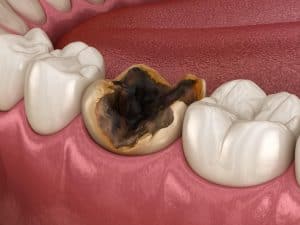Are you suffering from severe toothache? Your teeth may be displaying signs of discolouration. If these have occurred, it is a sign of an infected tooth.
Your teeth contain several nerves, located inside the pulp, located at the centre of the tooth. When you experience a toothache, it can be either mild or severe, and a tooth infection is likely to be the cause of it.
It is also likely to be a sign of a dental abscess.
There is a multitude of reasons why tooth infections occur. When dental nerves are removed, likely through restorative treatments such as a root canal or tooth extraction, it increases the risk of bacteria growing in the area. The body will struggle to fight off the bacteria, causing the infection.
It is important to recognise the signs that indicate that you have a tooth infection. Below outlines what these are.

Pain Whilst Eating
When biting down on foods, if toothache continues to persist, it is likely your tooth is infected. As you eat, the pain may also spread to the underlying gum and jaw bone because the infection is also spreading around the mouth. Medication may not be enough to halt the pain, but that is only a temporary measure.
Tooth Discolouration
Discolouration mainly occurs when your teeth show signs of a different colour. Your teeth will darken and show signs of yellow spots. When a tooth is infected, your tooth will darken in colour. This will increase over time and the tooth will begin to decay and the nerve will die.
Facial Swelling
An infected tooth can spread to your ear, jaw and neck within the same side of the affected tooth. The pain can become worse when you lie down. This can impact sleep and cause swelling on the face.
Bad Breath
Bad odour in the mouth is another direct indication of a tooth infection. The bacteria causing the infection will release the bad odour.

How You Can Prevent An Infected Tooth?
With a tooth infection, the first thing you need to do is book an appointment with the dentist. At the check-up, the dentist will be able to spot any issues with your teeth and gums. The pain you experience may persist and it is important that you describe the pain you’re experiencing. Symptoms will worsen if the infected tooth is ignored. The dentist will treat this by removing the source of the infection by draining away any pus that forms in the tooth. The dentist may consider either root canal treatment to remove the abscess, before filling and sealing the affected tooth.
Once treated, you may experience some tenderness. The dentist may recommend you clean the area by swishing the saltwater in the mouth. You may also prescribe pain-reliever medication.
If you’re showing signs of an infected tooth, it is important that you contact Ashfield Family Dental immediately for an appointment. Get started now by clicking here.




